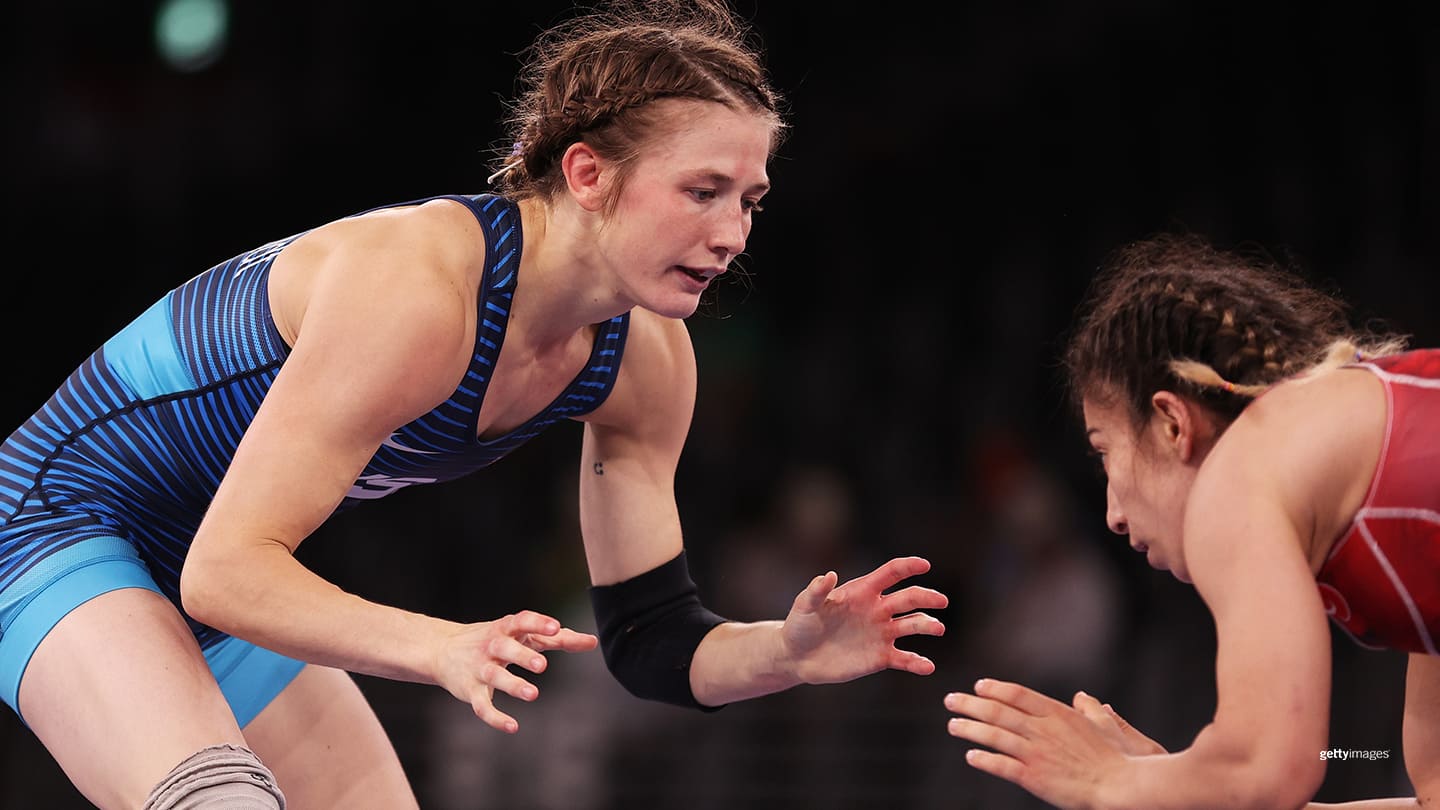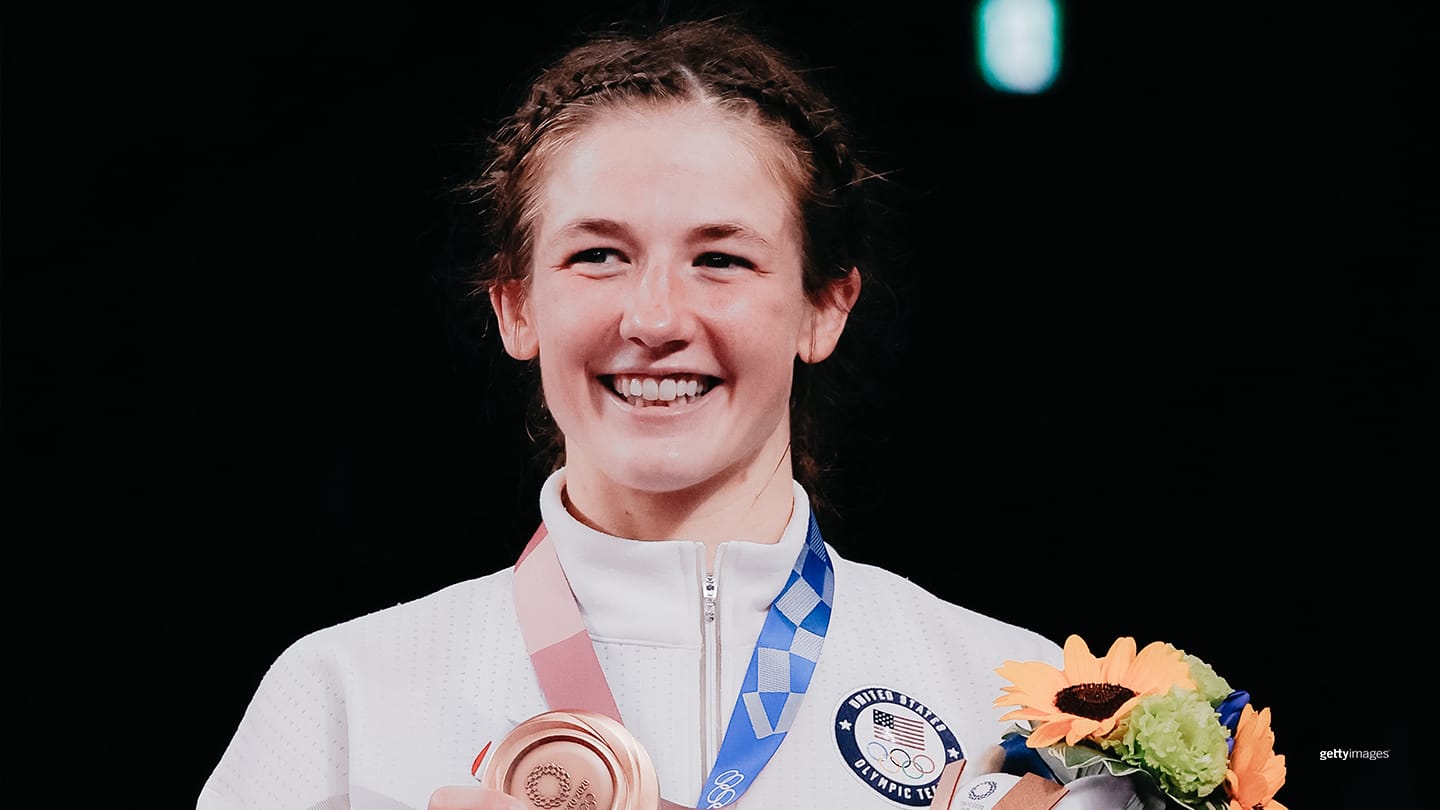
Wrestler Sarah Hildebrandt Couldn’t Pass Up A Shot At A World Championship
by Karen Price

Sarah Hildebrandt competes against Evin Demirhan of Team Turkey during the Women's Freestyle 50kg 1/8 Final at the Olympic Games Tokyo 2020 on Aug. 06, 2021 in Chiba, Japan.
It was 4 a.m. in Tokyo, and Sarah Hildebrandt couldn't sleep.
A first-time Olympian, she was wrestling for the bronze medal in the women’s 50 kg. category later that day, but it wasn’t nerves keeping her awake.
It was the fallout from the night before, when she led her semifinal match 7-0 only to lose in the final seconds. She’d come heartbreakingly close to the chance to wrestle for gold, and nothing could settle her enough to rest.
So she decided to go for a run.
“I was like, OK, you just have to say good morning to everyone you see,” said Hildebrandt, 28, from Granger, Indiana. “They don’t know what happened to you last night. You just need to switch your perspective. Say good morning to everyone you pass because this could be a perfectly normal day to them, so try to buy into that. I hadn’t slept at all, I’d cried all night, my eyes were beet red and I was just running down the street in Tokyo saying, ‘Good morning! Good morning!’ People probably thought I was insane. But it served its purpose.”
Refocused, Hildebrandt went on to win the bronze medal, dominating Oksana Livach of Ukraine, 12-1.
The Olympic experience taught her about resiliency, but it wasn’t just that 48-hour span in Tokyo. It was the whole year-plus leading up to those two days, after the Games were postponed and everyone had to readjust not just physically but also mentally and emotionally.
Now, her resiliency will be tested once again when she takes the mat at the World Wrestling Championships in Oslo, Norway, beginning on Saturday. The U.S. is going into the meet with eight of its nine Olympic medalists, previous Olympic and world team members and some talented newcomers.
But for the first time ever, because of the postponement, the competition also falls just two months after the Olympic Games.

Sarah Hildebrandt poses at the Olympic Games Tokyo 2020 Aug. 7, 2021 in Chiba, Japan.
If you’d asked Hildebrandt before Tokyo if she planned on competing in Oslo, she would have said no.
“I was a full, hard no,” she said. “I was like, I’m absolutely not doing that, there’s no way. But, you know, the Olympics went the way they did and that left a sour taste in my mouth. And I was just thinking, I wanted it to be my decision. I know my coaches wanted me to do worlds, and some of my teammates probably did, but I wanted to make sure it was something I wanted to do. It’s not just another competition, it’s worlds. It’s a big ask. It takes a lot of preparation and there was no downtime. I knew my body and my mind needed downtime.”
The Olympic medalists, who were all offered spots on the world team, had a week from the end of the Games to accept their invitations. Trying to make a decision, again Hildebrandt went for a run.
That’s when it hit her.
As a kid coming up through the sport, competing at the world championships was something she dreamed of. Her younger self would have never imagined having the opportunity and turning it down.
“How could I turn away something that means so much?” she said. “And I love competing. It’s really fun. I actually enjoy it purely for the chance to compete, so I couldn’t turn away from that. There have definitely been some days since when I was like, what the hell was I thinking? But there’ve also been moments when I’m like I love this, I’m glad I’m doing it.”
The weeks since Tokyo have been a balancing act, and one that signals a maturation in Hildebrandt’s athletic career. She’s had to learn how to ramp back up and prepare to the best of her ability, but also honor what her body and mind need in light of the fatigue and emotional fluctuations she can’t deny.
“I’m trying to make it as much as I can like my Olympic preparation but still giving myself enough grace to say, ‘What serves me today?’” she said. “Usually I wouldn’t try a new training method before worlds, but this is how it’s presenting itself and maybe being forced into it is how I’m going to learn. It’s different, but in a good way. I’m trying to be more intuitive and listen to myself more and not just be this mechanical, ‘Do this, do this, do everything perfect’ type. I’m trying to understand how can this serve me and make this enjoyable while still getting the results I want.”
Hildebrandt is hoping for big things at worlds, not just for herself but also for the women’s team. They’ve won only one world team title and that was back in 1999, but this year’s squad includes five 2020 Olympians, four of whom medaled. Part of the reason Hildebrandt wanted to compete was to be part of the squad and go for the program’s second-ever team gold.
Once she’s home, though, Hildebrandt plans to take a much-deserved break. She’s not ruling out a run at Paris in 2024, but she’s also prepared to let that decision come to her in its own time.
“I’m going to step away and turn inward and see what I want and listen to that,” she said. “I don’t want to put a date on the calendar and say, ‘This is the date I’m coming back,’ or ‘I have to be ready for this competition.’ I want it to come from within. And maybe that’s two months from now or maybe I take a whole year off from competing. I don’t know. But I think time away will make that a lot more obvious.”
Karen Price is a reporter from Pittsburgh who has covered Olympic and Paralympic sports for various publications. She is a freelance contributor to TeamUSA.org on behalf of Red Line Editorial, Inc.